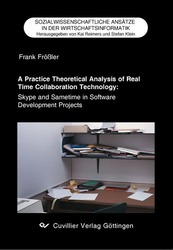| Departments | |
|---|---|
| Book Series (97) |
1381
|
| Nachhaltigkeit |
3
|
| Gesundheitswesen |
1
|
| Humanities |
2369
|
| Medienwissenschaften | 16 |
| Theology | 57 |
| Philosophy | 102 |
| Law | 423 |
| Economics | 851 |
| Social sciences | 417 |
| Sports science | 48 |
| Psychology | 233 |
| Educational science | 190 |
| History | 183 |
| Art | 111 |
| Cultural studies | 166 |
| Literary studies | 117 |
| Linguistics | 88 |
| Natural Sciences |
5408
|
| Engineering |
1795
|
| Common |
98
|
|
Leitlinien Unfallchirurgie
5. Auflage bestellen |
|
Advanced Search
A Practice Theoretical Analysis of Real Time Collaboration Technology: (Volume 2) (English shop)
Skype and Sametime in Software Development Projects
Frank Frößler (Author)Preview
Table of Contents, Datei (48 KB)
Extract, Datei (61 KB)
Real-time collaboration technology is a new genre of information and communication technology which has ist roots in both the telecommunications and groupware market. So far, discussion surrounding RTC are rather undifferentiated and regard the technology as a universally applicable remedy for a broad spectrum of social, organisational, and technological issues. This book aims to contriute to our understanding of RTC by investigating the enabling and constraining capabilities of RTC,the implications of teh technology on people’s life world, as wel as the implications of the socio-organisational dimension on RTC use. As part of the As part of the research, two in-depth case studies were conducted to analyse the use of RTC within software development projects. Data collection included interviews, observations, documentation, and communication protocols of RTC conversations. The two companies did not only differ regarding their socio-organisational context but they were also examples of innovative and conservative RTC use.
Drawing upon a practice theoretical lens which explicates concepts such as knowledge, power, awareness, and materiality, the analysis seeks to develop a better comprehension of RTC. More specifically, the discussion conceptualises the dynamic element introduced by RTC into work practices. Furthermore, the argument is concerned with the role of RTC-mediated practices for the production of awareness and the sensation of co-presence in co-located and dispersed settings. Finally, broader socio-organisational practices are examined which either facilitate or impede an open and experimental engagement with RTC.
Informed by the empirical results and the analysis, the thesis gives some recommendations for practitioners. In particular, it describes the collaborative achievement of balancing organisational designing and constant opportunities for change as a process which needs to be continuously negotiated between management and users.
| ISBN-13 (Printausgabe) | 3867276781 |
| ISBN-13 (Hard Copy) | 9783867276788 |
| ISBN-13 (eBook) | 9783736926783 |
| Language | English |
| Page Number | 262 |
| Edition | 1 Aufl. |
| Book Series | Sozialwissenschaftliche Ansätze in der Wirtschaftsinformatik |
| Volume | 2 |
| Publication Place | Göttingen |
| Place of Dissertation | Dublin |
| Publication Date | 2008-08-14 |
| General Categorization | Dissertation |
| Departments |
Economics
Social sciences |
| Keywords | Real Time Collaboration, Practice Theory, Materiality, Awareness, Software Development. |








